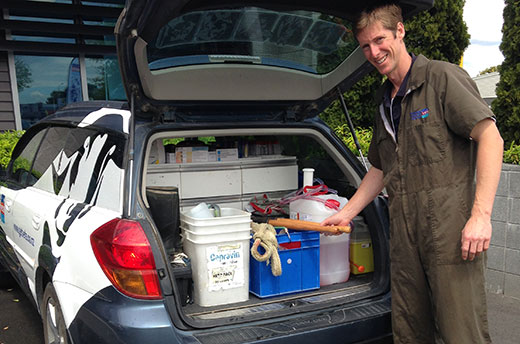Dairy farmers are being warned against slashing their animal health budgets as a knee-jerk response to a reduced forecast payout this season.
Fonterra has reduced the forecast Farmgate Milk Price for the 2014/2015 from $6 to $5.30 per kg milksolids.
Dr Phil Rennie of Tauranga Vets says farmers shouldn’t compromise on their stock’s animal health. The drop is forcing some owners, operators and sharemilkers to re-evaluate their operating expenses. DairyNZ, the industry good organisation representing New Zealand dairy farmers, estimates about one-quarter of farmers, particularly those with a lot of debt, will be forced to make some tough decisions as they work out how they can remain profitable. However, Tauranga Vets’ Dr Phil Rennie says farmers could find themselves under more financial pressure in the long run by not continuing to make their stock’s animal health a priority. “There will be farm working expenses that can be adjusted but farmers should avoid compromising on their animal health. “Less investment in that area now is likely to cost farmers more long-term, as the result of their herd’s poor reproductive performance or farmer’s taking shortcuts with their animal husbandry. “With calving over for most farmers, the main issues on farm between now and Christmas are reproduction, mastitis and lameness. “It’s important farmers invest in ways to ensure their cows get back in calf as soon as possible and address any infection or animal welfare issues, which can be costly if they’re not dealt with effectively or ignored altogether.” Kiwi dairy farmers are no longer permitted to induce cows, which had been used as a management strategy to shorten calving spreads and ensure cows had more “days in milk”. More proactive farm management is now required to reduce the number of late-calving cows through industry-recognised, best practice strategies and veterinary advice. A study of 41 Bay of Plenty dairy farms carried out by DairyNZ supports the view careful cost control is the greatest driver of profit, regardless of farming system. Analysis of the most profitable operators’ Dairy Base figures also shows they achieve more milk solids per hectare before December 31 than the average Bay of Plenty farmer. “This illustrates how much of a financial impact an early calving can have on your bottom line. “But it’s the work farmers do during the pre-mating and mating period that will set them up for a successful calving next season. This includes metri-checking cows, treatment of non-cyclers and disease screening of your bulls.” Phil says infection control and treatment should also remain a priority for dairy farmers. Mastitis infections are usually caused by bacteria entering through the teat end; and if left untreated can hit farmers hard in the pocket due to lost milk production. DairyNZ estimates total costs of mastitis for an average herd of 300 mixed age cows to be $54,500 per year or $180 per cow. Its overall cost to the industry is about $280 million annually. “Our most proactive clients are submitting milk samples for testing and discussing treatment options early and we encourage more farmers to do this. “We can also help farmers revise their strategy towards mastitis control because prevention is always better than cure.” Lame cows also have an impact on milk production – and the Tauranga Vets large animal vet team encourages farmers to make use of Dairy NZ’s Healthy Hoof programme to reduce the incidence of lameness. “A lame cow won’t eat properly and will go off its milk. When bulls go lame, their ability to naturally mate is affected and it can take up to six weeks for sperm production to recover after a bout of illness. “Equally, cows seen limping or in pain is an animal welfare issue, which the industry and wider public does not tolerate. “Getting the animal health basics right can boost your production, the fertility of your herd and maximise the financial returns you’ll receive at the end of the season.”



0 Comments
Leave a Comment